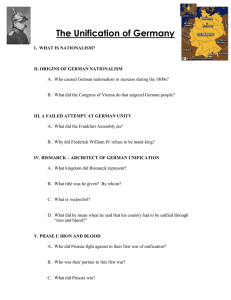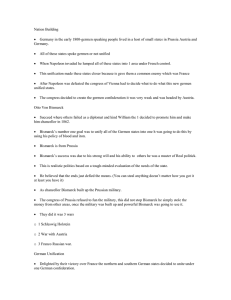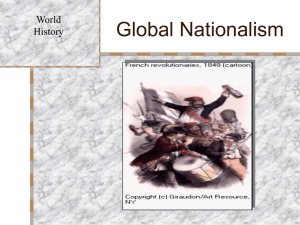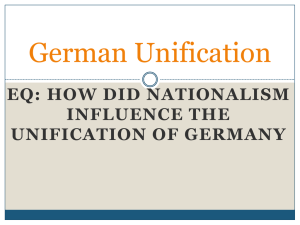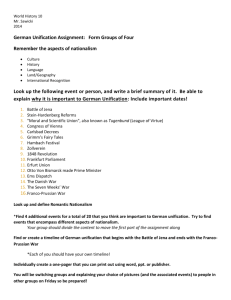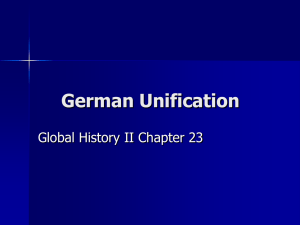The Unification of Germany
advertisement
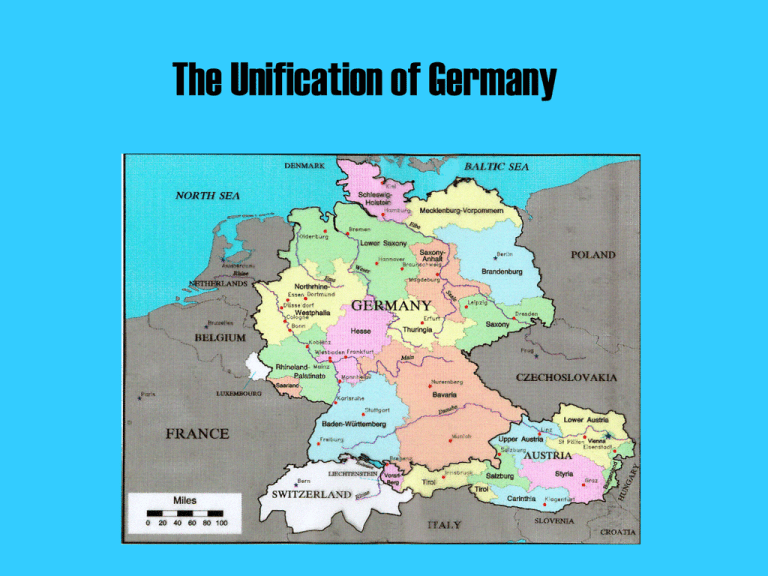
The Unification of Germany What is nationalism? 1. Devotion and love for one’s country. 2. The desire for national independence felt by people under foreign domination. Origins of Nationalism • Napoleon’s conquest results in German nationalism • The Congress of Vienna did not address their desire for a single German state A Failed Attempt at German Unity • Frankfurt Assembly (1848) – Germans offer throne to Frederick William IV of Prussia • Why did he refuse? • He did not believe that the people should have the power to make him king Prussia Leads the Way Bismarck – Architect of German Unification • Otto von Bismarck – Appointed chancellor (prime minister) by King William I of Prussia – Realpolitik v. Idealism – “Iron and Blood” policy to unite Germany “Not by speeches and votes of the majority, are the great questions of the time decided — that was the error of 1848 and 1849 — but by iron and blood.” PHASE I: “Iron and Blood” • 3 Wars – War with Denmark • Alliance with Austria • Seized Schleswig from Denmark – War with Austria • Prussia added Holstein and other German States – Franco-Prussian War • Ems Dispatch • Adds final remaining territory “Let us lift Germany, so to speak, into the saddle. It will certainly be able to ride.” Territory Added by Bismarck “Laws are like sausages, it is better not to see them being made.” Germany: The Second Reich (Empire) The new German government: Kaiser William I (Kaiser Wilhem I) Bundesrat "Upper House" Appointed by rulers of German States Could veto any Reichstag decision Reichstag "Lower House" Universal Male Suffrage “I have seen three emperors in their nakedness, and the sight was not inspiring.” Yo Bismarck, what up?! PHASE II: INDUSTRIALIZATION Rapid Industrial Growth due to: – – – – Iron and Coal Disciplined work force Large population growth Leading scientists and chemical companies (Krupp Family) Early Domestic Problems • Campaign against the Catholic Church – Kulturkampf – Backfired • Campaign against Socialists – Backfired again • Bismarck also refused to conquer more land for William II • William II asked Bismarck to resign as a result • “There is only one master in the Reich and that is I.” Long –Term Effects of German Unification • William II’s desire for expansion will cause Germany to continue building up its army and ultimately lead to German involvement in WWI. Review • Who was the Prime Minister who unified Germany? • What was the name of the kingdom that most greatly pressed for unification? • What was Bismarck’s policy to unify Germany called and what did each part stand for? • What problems did Bismarck run into after unification? • Who was the Kaiser who fired Bismarck and led his country into the First World War? Germany When was it finally united? What state led the way? Prime Minister? King/Kaiser Origins of nationalism Who opposed unification? Italy
